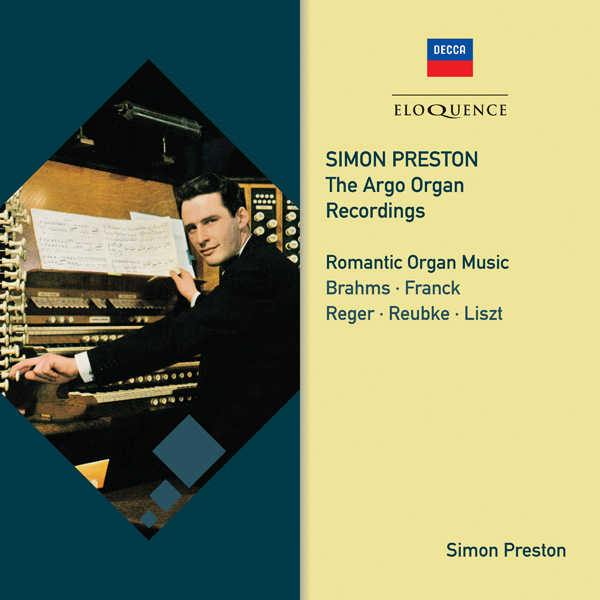Music from five original Argo albums, newly remastered and compiled together for the first time in a 2CD set, with new booklet notes on the music and a tribute to Simon Preston.
During the 1960s, it often seemed as if a new Simon Preston organ LP appeared every few months: so much in demand was his playing, so well suited was he to the recording medium’s time-management pressures and so nonchalantly did he seem to don the mantle of the United Kingdom’s ablest young organist. Besides the Franck EP featured here and a selection of the Brahms chorale preludes, Preston released an astonishing ten solo-organ recordings on Argo alone between 1963 and 1968; astonishing not least because of the large amount of preparation (on top of the day job) necessarily involved in works such as Liszt’s ‘Ad nos’ Fantasia.
The Franck pieces were recorded first, at the organ of the Chapel of King’s College, Cambridge, in company with Messiaen’s ‘L’Ascension’, in August 1962 while Preston celebrating his 23rd birthday. Upon leaving Cambridge, he became sub-organist of Westminster Abbey where he recorded Reubke’s huge Sonata on the 94th Psalm in February 1964, coupled with a toccata, a fugue and a fantasia by Reger. At last, in Preston, audiences in London and across the UK had an organist who assumed the technique of a concert pianist. Meticulous in all matters, he took extraordinary care over registration, especially between phrases and in transitions: not least in the Liszt, which was recorded on the huge 1911 Forster & Andrews organ of Hull City Hall (rebuild by Compton, 1950). Having left the Abbey in 1967, Preston took over the music at St. Albans Abbey for a year in 1968 and during this brief period he recorded the six chorale preludes by Brahms which open this collection. A special note on the recordings has been contributed by Roy Goodman.
This anthology is one of five newly remastered sets canvasing Simon Preston’s complete solo organ recordings for Argo. They also include Preston’s complete recordings of Messiaen (482 4917), ‘Simon Preston at Westminster Abbey’ (482 4933), and 20th-century organ music (482 4925) by Elgar, Hindemith and Maxwell Davies, and an organ spectacular featuring the Variations on America (482 8101) of Charles Ives.
JOHANNES BRAHMS
Chorale Preludes, Op. 122 Nos. 1, 8, 4 & 10*
CÉSAR FRANCK
Prélude, Fugue et Variation, Op. 18*
Choral No. 2 in B minor
Pièce héroïque*
MAX REGER
Toccata in D major, Op. 59 No. 5*
Fugue in D major, Op. 59 No. 6*
Fantasia on the chorale ‘Straf’ mich nicht in deinem Zorn’, Op. 40 No. 2*
JULIUS REUBKE
Sonata in C minor on the 94th Psalm*
FRANZ LISZT
Fantasia and Fugue on the chorale ‘Ad nos, ad salutarem undam’, S.259*
Prelude and Fugue on B.A.C.H., S.529*
Simon Preston, organ
Organ of St. Alban’s Cathedral (Brahms)
Organ of the Chapel of King’s College, Cambridge (Franck)
Organ of Westminster Abbey (Reger, Reubke)
Organ of City Hall, Hull (Liszt)
*FIRST INTERNATIONAL CD RELEASE ON DECCA
Recording Producers: Michael Bremner (Brahms, Liszt); Andrew Raeburn (Franck, Reger, Reubke)
Balance Engineers: Stanley Goodall (Brahms); Kenneth Wilkinson (Franck); Michael Mailes, Peter van Biene (Liszt)
Recording Locations: St. Alban’s Cathedral, London, UK, 15–17 January 1968 (Brahms); Chapel of King’s College, Cambridge, UK, 3–4 August 1962 (Franck); Westminster Abbey, London, UK, 24 & 27 February 1964 (Reger, Reubke); City Hall, Hull, Yorkshire, UK, 26 & 30 July 1966 (Liszt)
Remastering Engineer: Craig Thompson
Original Argo LP Releases: ZFA 47 (Franck: Prélude, Fugue et Variation); ZRG 5339 (Franck: Choral No. 2, Pièce héroïque; Messiaen: L’Ascension); ZRG 5420 (Reger, Reubke); ZRG 503 (Liszt); ZRG 571 (Brahms)
‘Simon Preston plays Franck in a way that pleases the English ear, gauges tempi and climaxes skilfully, and wrests from King’s organ colours that do no disservice to this music.’ Musical Times, December 1963
‘Simon Preston, the brilliant young player … has already made several records, but this is perhaps his best so far … he gives performances which are specially notable for their sense of continuity and rhythmic control.’ Gramophone, October 1964 (Reubke and Reger)
‘His technique is as good – and in some cases superior – to the continental virtuosi; in addition he brings to his playing an individuality and warmth that reflects his own engaging personality. He has become in a very short time a true ambassador for the organ.’ Gramophone, June 1967

